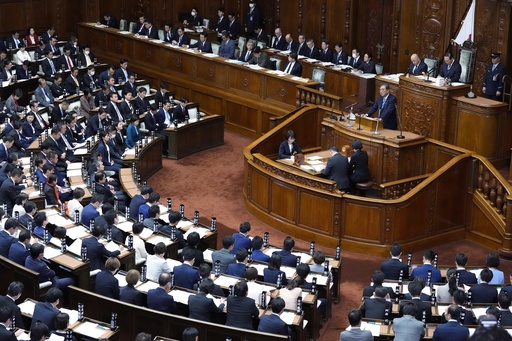
TOKYO — In the wake of a significant election defeat, Japanese Prime Minister Shigeru Ishiba has committed to collaborating with opposition parties, marking a shift in governance for his beleaguered administration. The Liberal Democratic Party (LDP) and its coalition partner, Komeito, suffered a loss in the Oct. 27 elections, losing their majority in the 465-seat lower house of Japan’s parliament. This outcome has set the stage for Ishiba to lean on opposition support to maintain his fragile government.
The election results were largely attributed to public discontent over financial missteps by the LDP. Responding to the electorate’s concerns, Ishiba is prioritizing swift reform initiatives. In his inaugural policy address since being reinstated as prime minister, he expressed a desire to engage fully with other political factions to foster cooperation. “We will thoroughly listen to other parties and form a consensus as broadly as possible,” he remarked, emphasizing a commitment to protecting the nation’s safety and security.
Facing tough negotiations ahead, Ishiba’s administration will have to navigate the complexities of a diminished legislative power. The LDP has traditionally relied on its majority to push through its agenda, a practice often criticized as undemocratic during the era of former Prime Minister Shinzo Abe. With this majority lost, Ishiba will need to cultivate support from opposition parties for legislative measures, including budget proposals, raising concerns over potential political stalemates. However, analysts suggest that this predicament might foster increased public discourse and a more transparent decision-making process.
Renowned as an opponent of the late Abe’s policies, Ishiba sees this minority government as an opportunity to promote a more democratic approach. He articulated his vision of democracy, emphasizing the importance of integrating varied public voices into policy discussions to achieve improved outcomes. Furthermore, his party is working with the rapidly growing Democratic Party for the People, whose leader, Yuichiro Tamaki, has gained traction with proposals aimed at enhancing tax allowances and wages, especially benefiting younger and low-income voters.
Ishiba also conveyed aspirations for “open dialogues” with U.S. President-elect Donald Trump, stressing the necessity of strengthening the Japan-U.S. alliance, which he regards as pivotal to Japan’s foreign and security policies. He is keen on establishing a more equitable relationship between the two nations. Nonetheless, he anticipates facing significant demands from Trump, particularly regarding increased financial contributions for the stationed U.S. military personnel in Japan.
In a move to address the complexities of the U.S. military presence, Ishiba intends to propose joint utilization of American bases by Japan’s Self-Defense Forces. He also aims to resolve ongoing issues related to the Status of Forces Agreement, which has faced criticism for perceived inequities that favor the U.S.
In light of escalating threats from regional neighbors such as China, Russia, and North Korea, Ishiba underlined the necessity for a robust enhancement of Japan’s defense capabilities. He connected this objective with the need for ongoing collaboration with the U.S. and allied nations. Furthermore, he pledged to reinvigorate Japan’s economy, with particular attention to suburban growth through increased wages and investments, and vowed to improve disaster response measures. Preparations have commenced for a long-awaited disaster management ministry, slated for establishment by March 2027, an initiative that is expected to garner support from across the political spectrum.
